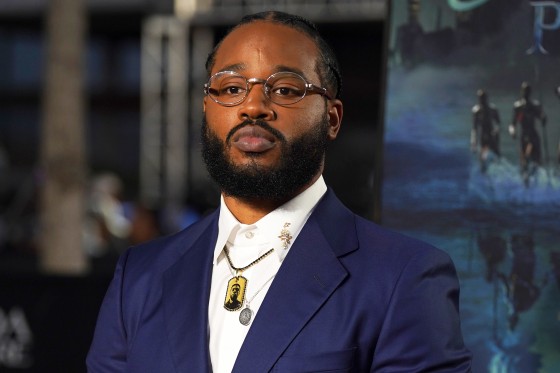With his critically acclaimed hit “Sinners,” director-writer Ryan Coogler cements himself as a transformational filmmaker. “Sinners,” a gleefully genre-bending, soulful vampire spectacle, signifies on the American and Southern legacy of white supremacy at a moment when teaching the uncomfortable history of race in America is being outlawed. Auteurs — and we can safely identify Coogler as such — often do this: produce revelatory work that is at once prophetic and a sign of the times in the national culture and the industry itself.
Coogler’s horror film reportedly has some Hollywood executives afraid.
But Coogler’s horror film reportedly has some Hollywood executives afraid.
Coogler requested and received a rare stake in his studio-produced film, securing from Warner Bros. first-dollar gross points, final cut and ownership of the film in 25 years.
An unnamed senior Hollywood executive told Vulture that some other studios are “freaking out” over Coogler’s deal and that it’s a “very dangerous” precedent that “could be the end of the studio system.”
Not so fast. Coogler’s one-film deal is rare, especially for an African American director, but it neither exists in a vacuum nor marks the fall of Hollywood’s studio system. Notably, Coogler has explained that he sought ownership for “this specific project” because it is inspired by his family’s history in Mississippi and has an extra personal significance for him.
Though he doesn’t expect to seek the same for future projects, Coogler clearly understands a fundamental truth: Long-term cultural ownership is a powerful legacy. The film itself touches on the commodification and theft of Black music and culture. The most important aspect of Coogler’s deal is ownership’s reverting back to him after 25 years.
That said, Coogler’s rare, more elevated-than-usual “ownership” of his film should be more common between studios and established filmmakers. The earliest entrepreneurial African American filmmakers were upset not only by the misrepresentation of Black Americans on screen but also by the racial and financial elitism perpetuated in the emerging moving pictures industry.
William Bill Foster of the short-lived Foster Photoplay Co. (1910); brothers Noble and George Johnson, who founded Lincoln Motion Picture Co.; Tressie Souders, the first African American woman to direct a feature film; and the prolific Oscar Micheaux — Tyler Perry’s model for writing, producing and distributing his work — all understood that ownership was critical to their ability to construct and sustain a competitive film system that privileged an alternative gaze, material and audience.
Coogler clearly understands a fundamental truth: Long-term cultural ownership is a powerful legacy.
Micheaux famously balked at selling his novel “The Conqueror” (later “The Homesteader”) to the Johnson brothers without the right to direct and have a stake in owning the movie adaptation. So he created his own motion picture company instead, Micheaux Film & Book Co.
Spencer Williams, Micheaux’s peer in the 1930s and ’40s, accumulated an impressive number of film credits across genres as a director-actor while navigating the challenges of trying to make Black independent films and projects for white-owned companies producing “race films” — that is, those targeted to Black audiences. His journey anticipated the journeys of subsequent filmmakers such as Melvin Van Peebles and Spike Lee, who fought with the Hollywood studio system for control over the stories they wanted to tell and how those stories would get produced and distributed.
Coogler’s shared ownership of “Sinners” is another example of the changes the digital, economic and physical transformation of moviemaking and viewing has ushered in. (Those changes were accelerated by the Covid pandemic.) Mega streaming platform studios such as Netflix once frequently negotiated what seemed like juggernaut deals for projects with selected talent, including Black storytellers like Issa Rae and Shonda Rhimes. However, the studio system hasn’t been felled by such deals.
And such deals don’t appeal to everyone. As an independent Black filmmaker once told me, he could direct his projects for such platforms and forgo the opportunity for outright (or significant) ownership of his content, or he could make his films independently and retain full ownership and have the opportunity to profit in perpetuity. Tyler Perry is the ultimate inside and outside man, so to speak. He has more control over production and ownership of his content than we generally see. But even he hasn’t toppled the studio system; rather, he operates in concert with it in his unique niche.
It’s strange, then, to read reports that Coogler’s deal has some Hollywood studios worried.
“Unprecedented” movie deals have existed a long time in Hollywood.
“Unprecedented” movie deals have existed a long time in Hollywood; they’re typically limited to a few seemingly sure-bet filmmakers — and only then with studio say-so. Charlie Chaplin was one of the first superstars to be granted a huge contract with creative control, but even he discovered how much his creative control was still subject to studio control over his creative vision and productions. That's why he banded with two partners to create a studio, United Artists. He didn’t destroy the studio system, but he was able to use his privilege to play a shrewd long game.
The recent actors’ and writers’ strikes are stark reminders that the industry is resilient at surviving cultural shifts and reproducing a small circle of studio power whether in brick and mortar or digitally. Coogler’s deal with Warner Bros., one of the original early major Hollywood studios, is to be applauded, no doubt, but there’s no need to toll the bell. The Hollywood studio system isn’t dead, and Coogler’s deal isn’t going to kill it.
